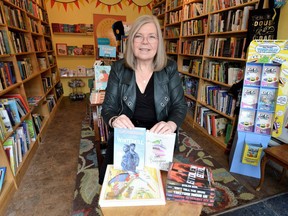
Marsha Skrypuch has achieved international success as a children’s author for the same reason her books are banned in Russia — she tells the truth.
Advertisement 2
Article content
Every detail in the Brantford-born author’s roughly 25 children’s books and young adult novels is backed by historical fact.
Article content
“Children’s authors have an unspoken agreement with their readers that they will tell the truth,” Skrypuch said during a recent interview in Simcoe.
“I don’t make anything up. I look it up.”
Skrypuch said she has to get the details right because her books — which are mainly set in war zones and feature kids as the protagonists — could be the first a child learns of difficult topics like the Armenian genocide, Vietnamese boat people and the Second World War .
As far as she knows, her picture book “Enough” was the first popular literary work to address the Holodomor, the famine engineered by the Stalin regime that killed millions of Ukrainians in the early 1930s.
Advertisement 3
Article content
A folk tale with a young girl as the heroine, “Enough” was published in 2000, “before most countries had even recognized the Holodomor as a genocide,” said Skrypuch, a third-generation Ukrainian-Canadian.
“It took me five years to do the research to write a picture book, because I wanted to make sure that everything I was alluding to could be historically based,” she said.
That book helped get Skrypuch and her writing permanently banned from Russia.
“I got hate mail and death threats to the point that when I did any kind of public presentation, I had to inform the police,” she said.
“It was really terrifying. And I endured that for years, because this wasn’t the only book I wrote that offended the Russian dictatorship.”
Advertisement 4
Article content
Her debut novel, “Silver Threads,” about the internment of Ukrainian-Canadians during the First World War, was published in 1996 and is still in print. She has published a new book every year since — a notable achievement for someone with dyslexia who did not learn to read until she was nine.
“I don’t put in extra words. I just have no patience,” Skrypuch said. “When I write, I want action.”
So do young readers, she said. But more than that, Skrypuch believes kids want to be taken seriously.
“They don’t want you to talk down to them,” she said.
Writing for children, Skrypuch added, “gives me an opportunity to expand their minds so they can be better people.”
“They can see that people in my stories always work from compassion, empathy and generosity,” she said.
Advertisement 5
Article content
“They don’t judge. They’re put in a situation that’s just horrific, but they always do the right thing.”
Skrypuch’s books include “Winterkill,” a tale of the Holodomor nominated for the 2024 Kobzar Book Award.
Among Skrypuch’s young protagonists “living with the results of adult decisions” is Lida, the heroine of her top-selling novel, “Making Bombs for Hitler.” Lida is an Ostarbeiter, the Eastern Europeans — mainly Ukrainians — forcibly taken to Germany during the Second World War to be used as slave labor by the Nazis.
“They were starved to death and worked to death,” Skrypuch said. “If they survived, they were re-educated to think that what they did (was) wrong.”
Finding little academic research about Ostarbeiters, Skrypuch interviewed survivors and researchers to glean insight.
Advertisement 6
Article content
“There had never been a book written on that topic before, and I wrote it,” said Skrypuch, who sees her historical fiction as one way to counter the “disinformation” from Russia and the former Soviet Union that she says “has all been to dehumanize Ukrainians.”
Skrypuch is a three-time nominee for the Kobzar Book Award, awarded by the Shevchenko Foundation to authors across a variety of genres whose work relates to Ukrainian-Canadians.
The self-described “massive advocate of independent bookstores” stopped by Firefly and Fox Books in downtown Simcoe last month to film a video introducing her Kobzar-nominated young adult novel “Winterkill,” a story of the Holodomor with parallels to the ongoing war in Ukraine.
Advertisement 7
Article content
This year’s Kobzar winner will be announced on March 21 at the Canadian Museum for Human Rights in Winnipeg.
Her next book is due out in November — the first in a trilogy called “Kidnapped from Ukraine,” about the current war.
Skrypuch said children’s books can help parents talk with their kids about war and injustice because authors convey a sense of the atrocity without the traumatic graphic details.
“Seeing all this stuff on the news, and it’s on your iPad on your lap, that’s really terrifying for a kid,” said Skrypuch, who is in demand as a guest speaker throughout North America and Europe.
“So if you show them a map and say, ‘This is happening here, and we’re here,’ it stops a few nightmares.”
Kids often want to help and Skrypuch suggests parents have some ideas ready, such as humanitarian organizations their children can support by donating their allowance.
“If you can instill in kids a sense of responsibility,” Skrypuch said, “then you make it a better world.”
JP Antonacci is Local Journalism Initiative Reporter based at the Hamilton Spectator. The initiative is funded by the Government of Canada.
Article content